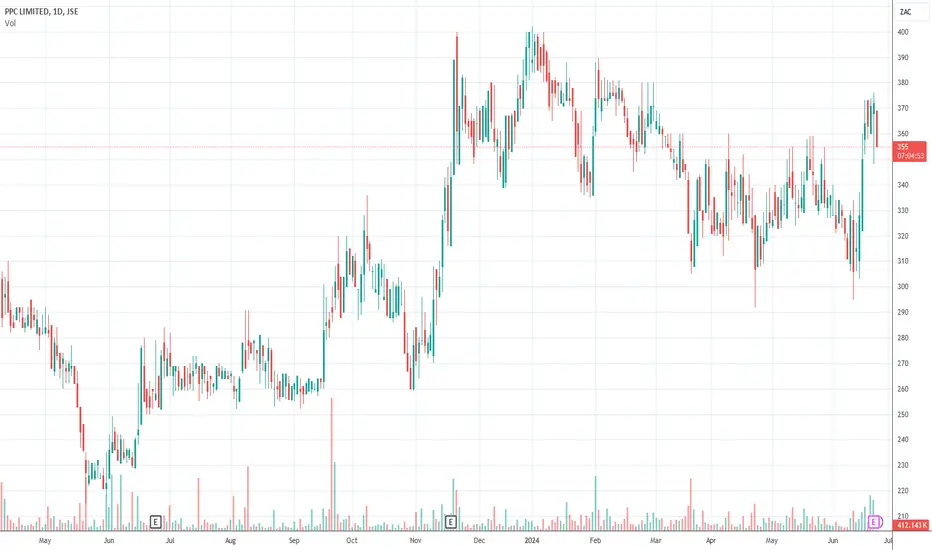PPC is a leading manufacturer and supplier of cement, aggregates, ready-mix, lime, limestone, and fly-ash in Africa. It has eleven cement factories in South Africa, Botswana, the DRC, Zimbabwe, Rwanda, and Ethiopia with a total production capacity of 11.5 million tons. It produces aggregates at its Mooiplaas quarry in Gauteng, which is the largest aggregates producer in South Africa. It has twenty-six batching plants for ready-mix in South Africa and Mozambique.
Importantly, the company has managed to re-negotiate its lending so that it no longer requires a highly dilutive rights issue. No dividends have been paid for the last five years. The carbon tax which came into effect on 1st June 2019 costs PPC between R100m and R120m, which it intends to pass on to consumers. This will make its pricing less competitive against foreign imports unless tariffs can be increased.
PPC is basing its hopes on growth from the rest of Africa. In our view, PPC has been suffering together with the entire construction industry from the lack of new government and quasi-government projects in South Africa. It has been compensating by cutting costs and investing in the rest of Africa, but we regard the cement industry as over-supplied currently, and therefore difficult to manage. The company has also been benefiting from the government's new "localisation" policy, in terms of which government operations have to buy locally produced cement.
In its results for the year to 31st March 2024, the company reported revenue up 20.6% and headline earnings per share (HEPS) of 19c compared with a loss of 20c in the previous year. The company said, "The SA and Botswana group cement revenues increased only marginally by 5.2%, driven by price increases and increased sales of clinker to Zimbabwe, which positively offset the declining cement sales volumes. Revenue from the materials businesses declined by 6.0% relative to the prior year."
Technically, the share was in a downward trend since its high of 568c in October 2021 and we advised waiting for a clear break up through a 65-day moving average which happened on 2-11-2022 at a price of 241c. Since then, the share has moved sideways and upwards to reach 369c, but remains volatile. The company is conducting a R200m share buy-back and has reduced its debt by 20%. On 26th January 2022, the company reported that the CEO and another director had sold about R240.5m worth of shares, which took the share price down sharply - but is not necessarily thought to be negative in the longer term.
Importantly, the company has managed to re-negotiate its lending so that it no longer requires a highly dilutive rights issue. No dividends have been paid for the last five years. The carbon tax which came into effect on 1st June 2019 costs PPC between R100m and R120m, which it intends to pass on to consumers. This will make its pricing less competitive against foreign imports unless tariffs can be increased.
PPC is basing its hopes on growth from the rest of Africa. In our view, PPC has been suffering together with the entire construction industry from the lack of new government and quasi-government projects in South Africa. It has been compensating by cutting costs and investing in the rest of Africa, but we regard the cement industry as over-supplied currently, and therefore difficult to manage. The company has also been benefiting from the government's new "localisation" policy, in terms of which government operations have to buy locally produced cement.
In its results for the year to 31st March 2024, the company reported revenue up 20.6% and headline earnings per share (HEPS) of 19c compared with a loss of 20c in the previous year. The company said, "The SA and Botswana group cement revenues increased only marginally by 5.2%, driven by price increases and increased sales of clinker to Zimbabwe, which positively offset the declining cement sales volumes. Revenue from the materials businesses declined by 6.0% relative to the prior year."
Technically, the share was in a downward trend since its high of 568c in October 2021 and we advised waiting for a clear break up through a 65-day moving average which happened on 2-11-2022 at a price of 241c. Since then, the share has moved sideways and upwards to reach 369c, but remains volatile. The company is conducting a R200m share buy-back and has reduced its debt by 20%. On 26th January 2022, the company reported that the CEO and another director had sold about R240.5m worth of shares, which took the share price down sharply - but is not necessarily thought to be negative in the longer term.
Disclaimer
The information and publications are not meant to be, and do not constitute, financial, investment, trading, or other types of advice or recommendations supplied or endorsed by TradingView. Read more in the Terms of Use.
Disclaimer
The information and publications are not meant to be, and do not constitute, financial, investment, trading, or other types of advice or recommendations supplied or endorsed by TradingView. Read more in the Terms of Use.
